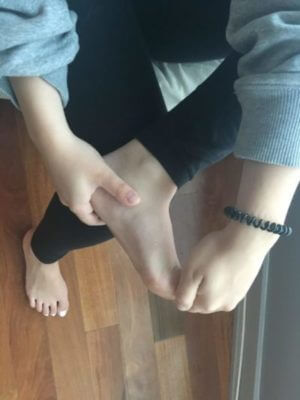Sharp heel pain when walking could be a common heel condition known as plantar fasciitis!
What is plantar fasciitis?
The plantar fascia is a thick connective tissue that supports the inside arch of the foot. It extends from the heel bone (calcaneus) to just below the toes (metatarsophalangeal joints) and is important for both propulsion and weight bearing. Plantar Fasciitis, also known as plantar heel pain, sharp heel pain when walking, heel spur syndrome, plantar fasciopathy or painful heel syndrome, is one of the most common foot conditions seen by physiotherapists.
What causes plantar fasciitis?
Plantar fasciitis is also common in running athletes or those who stand for prolonged periods of time for work. Other risk factors include: abnormal knee, ankle and/or foot alignment, obesity, calf muscle tightness or weakness, fast increase in training, and/or inadequate footwear.
How do I know that my sharp heel pain when walking is Plantar Fasciitis?
Plantar Fasciitis usually presents as intense sharp heel pain when walking, located mostly where the plantar fascia attaches to the front of the heel. Typically, the sharp heel pain when walking is worse when first walking in the morning or after a period of rest, though it can also occur after prolonged walking or standing. Foot stiffness and heel swelling may also be present.
What can I do at home if I have plantar fascitis?
Lunging Calf Stretch: Step forward with your unaffected leg in a mini-lunge; bending your front leg forward, and keeping your back leg straight and your heel on the ground. You can lean forward and place your hands on a wall in front of you for balance if necessary. You can progress this exercise by increasing the distance between your feet to increase the stretch.

Passive Foot and Toe Stretch: Sitting upright with your leg crossed so that your affected foot is resting on your opposite knee, relax your foot. Use your hand to pull your foot and toes up towards your shin. You can massage the bottom of your foot and heel while holding the stretch
When should I seek physiotherapy if I have plantar fasciitis?
If your plantar fasciitis hinders your activities of daily living, such as walking, exercise, standing or effects your job productivity then it is time to contact a physiotherapist. Shawn Williams is a physiotherapist who has over a decade experience working with plantar fasciitis. You can contact Shawn by text or call at 416-660-4187 to find out how his manual physiotherapy approach can quickly reduce your heel pain so that you can live pain free and return to all your normal activities. A free phone consultation is also available to find out more about how a manual physiotherapy approach can be an effective treatment for heel pain.




